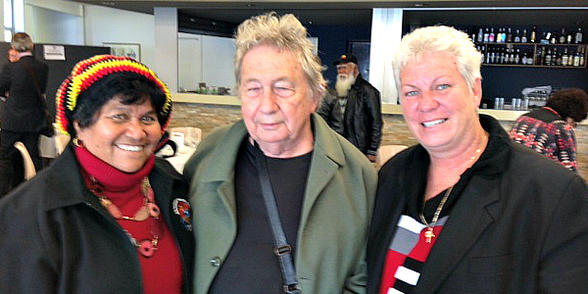natsilmh-photo.jpg

Professor Gracelyn Smallwood, Professor Michael Chandler and Sandy Gillies (Queensland Mental Health Commission) attend the summit.

Indigenous and international leaders in mental health gathered in Perth last week to address the unacceptably high rates of suicide in Australian Indigenous communities, and for the launch of the National Aboriginal and Torres Strait Islander Leadership in Mental Health group.
NATSILMH’s aim is to help restore, maintain and promote the social and emotional wellbeing and mental health of Aboriginal and Torres Strait Islander peoples by advocating and providing advice and leadership in these areas. It also aims to reduce the high rates of suicide among Aboriginal and Torres Strait Islander peoples.
NATSILMH is a core group of senior Aboriginal and Torres Strait Islander people working in the areas of social and emotional wellbeing, mental health and suicide prevention. The group is jointly supported by the state and national Mental Health Commissions with many of the group’s representatives involved with the Commissions and other leading Indigenous health organisations.
Speaking at the launch, National Aboriginal and Torres Strait Islander Leadership in Mental Health Chair Professor Pat Dudgeon said that as a nation we must work to reduce the unacceptably high rates of suicide in Indigenous communities.
“This will involve building on our cultural, family and community strengths, ensuring mental health and suicide prevention services are culturally appropriate, and that our communities are at the centre of the design and delivery of programs,” she said.
“Aboriginal and Torres Strait Islander people are dying at twice the rate of other Australians from suicide, and among younger age groups the rate can be six times higher. Something must be done to stop this now,” said Professor Dudgeon, who was the co-convenor of the roundtable.
During the two-day roundtable meeting NSW Mental Health Commissioner John Feneley officially launched National Aboriginal and Torres Strait Islander Leadership in Mental Health (NATSILMH) with Western Australian Mental Health Commissioner Timothy Marney also attending.
“The establishment of the group here today sends a strong signal to all Australian governments that we already have a formidable force of Aboriginal and Torres Strait Islander leaders in mental health.
They should be at the centre of policy conversations not only in relation to the mental health of Aboriginal and Torres Strait Islander people, but also to wellbeing more generally, across the whole community,” said Commissioner Feneley.
To date, NATSILMH has contributed a submission to the National Mental Health Commission’s National Review of Mental Health Services and Programmes, and the group plans to participate in the National Children’s Commissioner’s Inquiry into Suicide and Self-harm in Young People and Children.
The two day Perth meeting also saw Professor Michael Chandler, a noted expert in suicide prevention among Canadian First Nations people, attend roundtable discussions with some of the 29 Elders from Cape York to the Kimberley, who contributed to the landmark Elders’ Report into Preventing Indigenous Self-Harm and Youth Suicide. Aboriginal and Torres Strait Islander Elders, youth leaders, health professionals, academics, social justice campaigners and government representatives also attended.
Discussions were centred on the importance of solutions for Indigenous mental health support and suicide prevention in Australia being led by Aboriginal and Torres Strait Islander peoples and the value of culture and self-determination in suicide prevention.
The second edition of the ground-breaking book Working Together: Aboriginal and Torres Strait Islander Mental Health and Wellbeing Principles and Practice was also launched. This resource is for all those who work in Aboriginal and Torres Strait Islander mental health and suicide prevention.
The two-day meeting was hosted by the Centre for Research Excellence in Aboriginal Health and Wellbeing, Telethon Kids Institute, the University of Western Australia’s School of Indigenous Studies, the Poche Centre for Indigenous Health, and National Aboriginal and Torres Strait Islander Leadership in Mental Health.
Additional information
- For more information about the NATSILMH and its members, visit http://natsilmh.org.au/
- Media statement: University of Western Australia School of Indigenous Studies - Summit to address unacceptably high rates of Aboriginal and Torres Strait Islander Suicide
- ABC Radio AM interview: New focus for Indigenous suicide prevention
- Roundtable address from the Queensland Mental Health Commission
